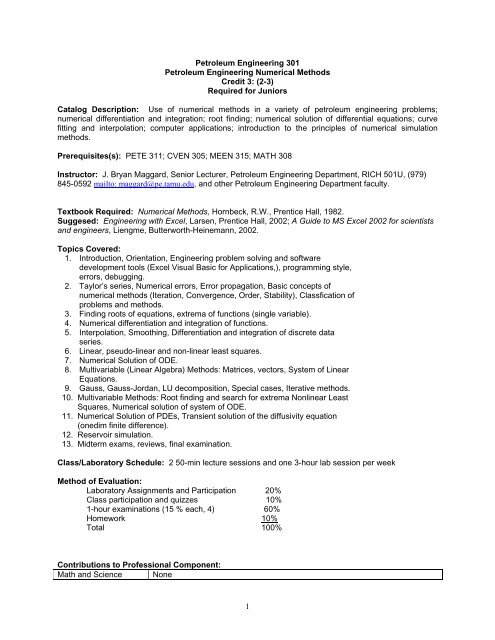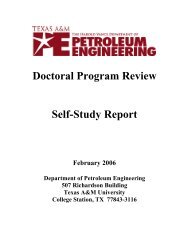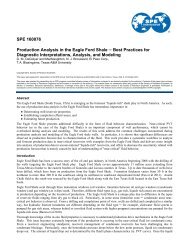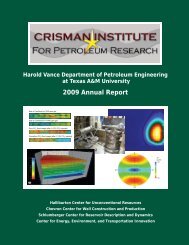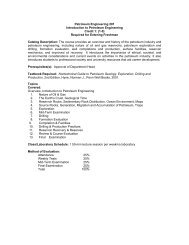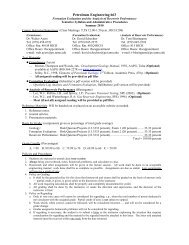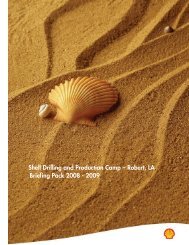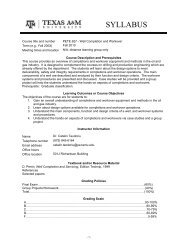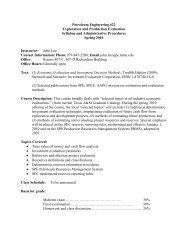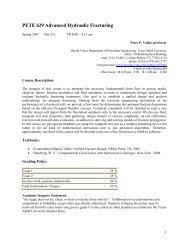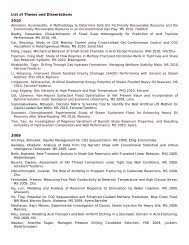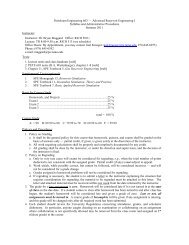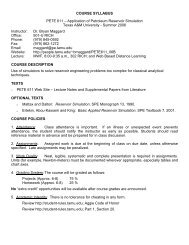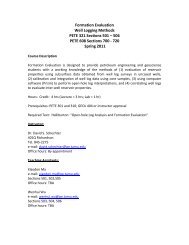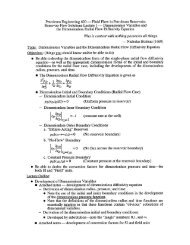Nontechnical Guide to Petroleum Geology, Exploration
Nontechnical Guide to Petroleum Geology, Exploration
Nontechnical Guide to Petroleum Geology, Exploration
You also want an ePaper? Increase the reach of your titles
YUMPU automatically turns print PDFs into web optimized ePapers that Google loves.
<strong>Petroleum</strong> Engineering 301<br />
<strong>Petroleum</strong> Engineering Numerical Methods<br />
Credit 3: (2-3)<br />
Required for Juniors<br />
Catalog Description: Use of numerical methods in a variety of petroleum engineering problems;<br />
numerical differentiation and integration; root finding; numerical solution of differential equations; curve<br />
fitting and interpolation; computer applications; introduction <strong>to</strong> the principles of numerical simulation<br />
methods.<br />
Prerequisites(s): PETE 311; CVEN 305; MEEN 315; MATH 308<br />
Instruc<strong>to</strong>r: J. Bryan Maggard, Senior Lecturer, <strong>Petroleum</strong> Engineering Department, RICH 501U, (979)<br />
845-0592 mail<strong>to</strong>: maggard@pe.tamu.edu, and other <strong>Petroleum</strong> Engineering Department faculty.<br />
Textbook Required: Numerical Methods, Hornbeck, R.W., Prentice Hall, 1982.<br />
Suggesed: Engineering with Excel, Larsen, Prentice Hall, 2002; A <strong>Guide</strong> <strong>to</strong> MS Excel 2002 for scientists<br />
and engineers, Liengme, Butterworth-Heinemann, 2002.<br />
Topics Covered:<br />
1. Introduction, Orientation, Engineering problem solving and software<br />
development <strong>to</strong>ols (Excel Visual Basic for Applications,), programming style,<br />
errors, debugging.<br />
2. Taylor’s series, Numerical errors, Error propagation, Basic concepts of<br />
numerical methods (Iteration, Convergence, Order, Stability), Classfication of<br />
problems and methods.<br />
3. Finding roots of equations, extrema of functions (single variable).<br />
4. Numerical differentiation and integration of functions.<br />
5. Interpolation, Smoothing, Differentiation and integration of discrete data<br />
series.<br />
6. Linear, pseudo-linear and non-linear least squares.<br />
7. Numerical Solution of ODE.<br />
8. Multivariable (Linear Algebra) Methods: Matrices, vec<strong>to</strong>rs, System of Linear<br />
Equations.<br />
9. Gauss, Gauss-Jordan, LU decomposition, Special cases, Iterative methods.<br />
10. Multivariable Methods: Root finding and search for extrema Nonlinear Least<br />
Squares, Numerical solution of system of ODE.<br />
11. Numerical Solution of PDEs, Transient solution of the diffusivity equation<br />
(onedim finite difference).<br />
12. Reservoir simulation.<br />
13. Midterm exams, reviews, final examination.<br />
Class/Labora<strong>to</strong>ry Schedule: 2 50-min lecture sessions and one 3-hour lab session per week<br />
Method of Evaluation:<br />
Labora<strong>to</strong>ry Assignments and Participation 20%<br />
Class participation and quizzes 10%<br />
1-hour examinations (15 % each, 4) 60%<br />
Homework 10%<br />
Total 100%<br />
Contributions <strong>to</strong> Professional Component:<br />
Math and Science None<br />
1


